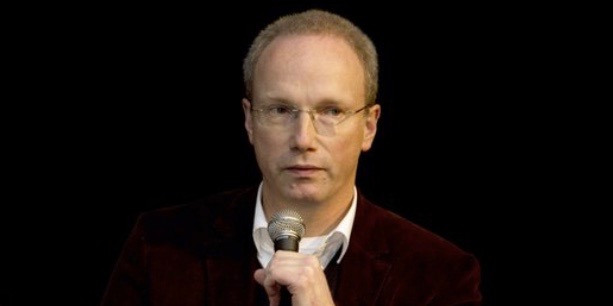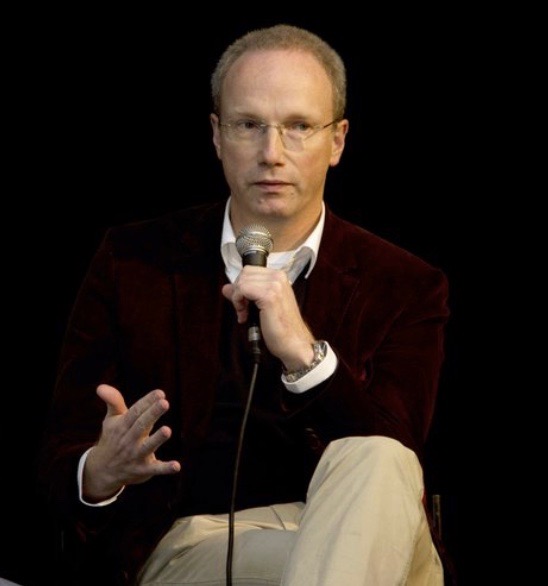“I love dealing with topics that go against the grain”

“What am I going to do when my time at PlanetS is up?” This is a question that doctoral students and postdocs who know how few and far between the coveted professorships are must ask themselves. In the InsiderS newsletter, we introduce physicists who have successful careers outside the university. Andreas Hirstein is head of the Science and Technology section of the renowned newspaper NZZ am Sonntag. “A degree in Physics makes it possible to take a closer look behind the scenes on many topics,” says the journalist, who has a doctorate from the ETH Lausanne.

Andreas Hirstein during an event in Hannover discussing “planned obsolescence”. (Photo IG Metall/Maik Matthias)
“A brilliant idea of how climate change policy could be made effective already exists,” says Andreas Hirstein. “Countries willing to reform should form a climate club.” A CO2 tax within the club would make fossil energy consumption more expensive, but the movement of goods between club members would be free. Imports from non-member countries would be subject to a uniform penalty fee. This system not only makes the club stable, it also motivates other countries to join at the same time. The idea came from the US economist William Nordhaus, who will receive this year’s Nobel Prize in Economics on 10 December in Stockholm (together with Paul Ronner, also a US economist).
Hirstein already presented Nordhaus’ climate club idea in the “NZZ am Sonntag” in 2015. “I found the model convincing,” says the editor responsible for the team of five-member working for the Science and Technology section at the NZZ am Sonntag. “What I particularly like about my profession is the fact that I can deal with issues that interest me. Hirstein and his team mainly choose topics that have social significance and ask what science can contribute. The weekly newspaper leaves the daily news to other media.
French as a bonus
Born in Rheinland-Pfalzin 1968, Andreas Hirstein studied physics in Bonn. To learn French, he moved to Lausanne and received his doctorate from EPFL in 1998. His dissertation included the construction of a scanning tunneling microscope that functions at very low temperatures in high vacuum and strong magnetic fields. He then went on to look for a job. “The job market was much more problematic than it is today,” he recalls thinking back 20 years ago, when it was particularly difficult to find a job. However, the Swiss Electrotechnical Association soon hired the new doctor of physics as an editor for its membership and technical journal. “It paid off that I spoke French, because this was a nationwide association,” says Hirstein.
In addition to his work for the journal, the physicist also wrote newspaper articles for a wider audience. “That interested me more,” he says. And from then on he also worked as a science journalist for the Tages-Anzeiger in Zurich. When the publishing house of the Neue Zürcher Zeitung launched a Sunday newspaper in 2002, he seized the opportunity to be there right from the start. In 2008 he was promoted to head of his section. “I have no training in journalism,” says the physicist, admitting that writing was by no means easy for him at the beginning. “I worked on every sentence, which was very tedious.” Scientific journalism also involves a great deal of translation, which is often underestimated. In no other department is it so time-consuming to understand the topics and present them in a way that is comprehensible to a broad audience without prior knowledge. “I often tackle a topic because I want to understand it better myself,” says Hirstein. “And I hope that readers will also be interested.”
1000 kilometres in reverse
One of his favourite topics is ‘planned obsolescence’ – “the claim that products are manufactured by companies in such a way that they break shortly after the warranty period, forcing people to buy something new – which is completely absurd”, explains the science journalist. A famous example is the light bulb, which has to be replaced after 1000 hours. Hirstein’s research showed that it would be easy to build a light bulb that would last 100 years, however, the light yield would be so poor that the electricity bill would be far too high for the customer. With more complex products, engineers try to achieve the same service life for all components. “Anything else would be inefficient – it would increase the cost of the end product and not benefit the customer,” says Hirstein, who likes to refute urban legends. With cars, this goes so far as to design the reverse gear in such a way that it breaks after less than 1000 kilometers because it’s simply not needed for a longer distance.
“I love dealing with topics that go against the grain,” says Hirstein. He benefits from this aspect of his career. “I think that people without a lot of scientific training often let themselves be led astray very easily.” Yet science and technology topics are omnipresent in all departments and in the business section of newspapers, in particular, one occasionally reads hair-raising assertions. “A degree in physics makes it possible to look behind the scenes on many topics,” Hirstein notes. However, more and more science journalists lack the time for research. Budget issues and job cuts make serious media work difficult in many places. The editor therefore doubts whether he should recommend young physicists to enter journalism. However, in addition to the variety of topics, the nice thing about the profession is meeting many interesting people. Last year, this included the famous astrophysicist and Nobel Prize winner Kip Thorne. (bva)
German version
NZZ am Sonntag
InsiderS No.15: Bettina Zahnd, head of accident research, AXA

